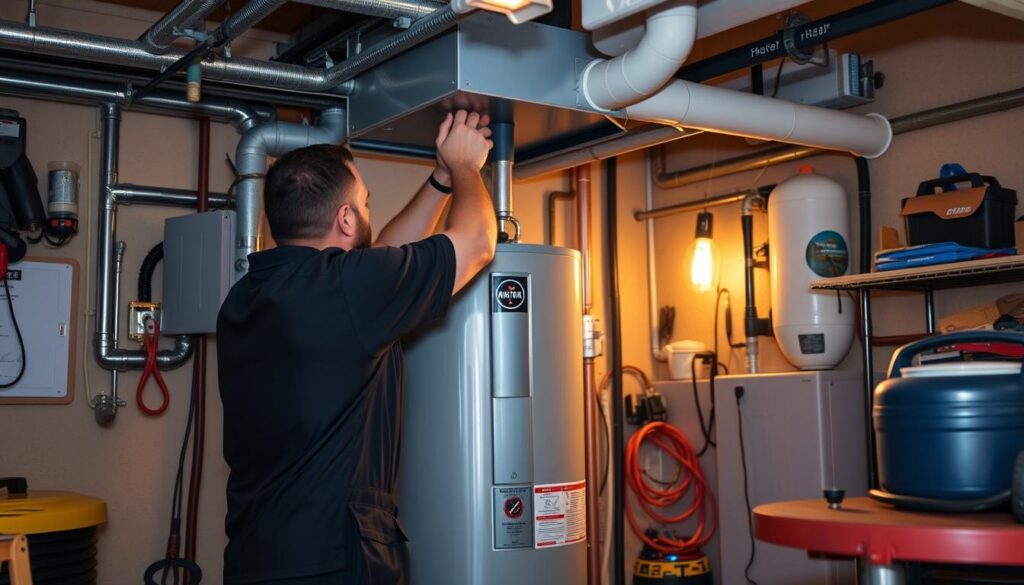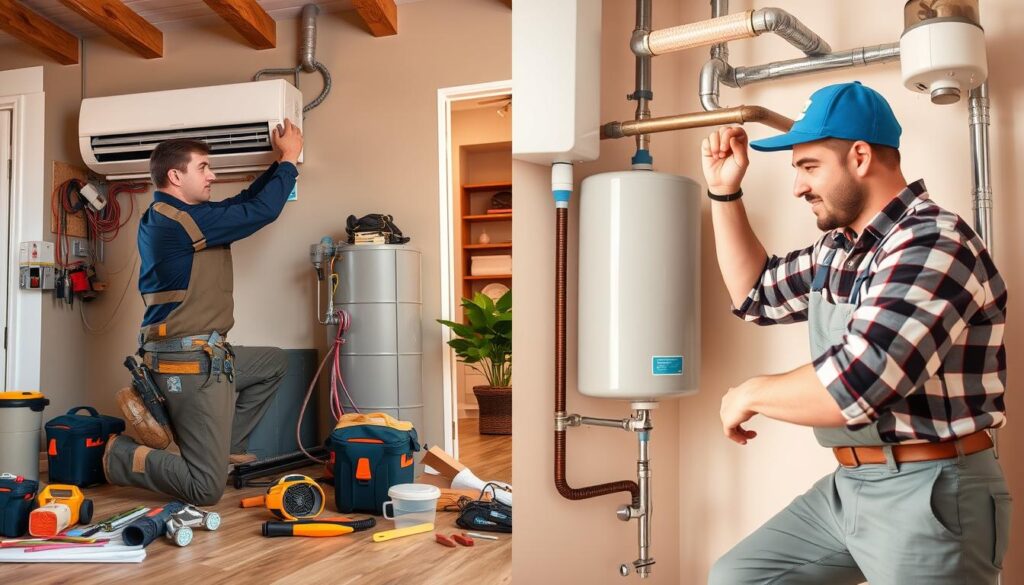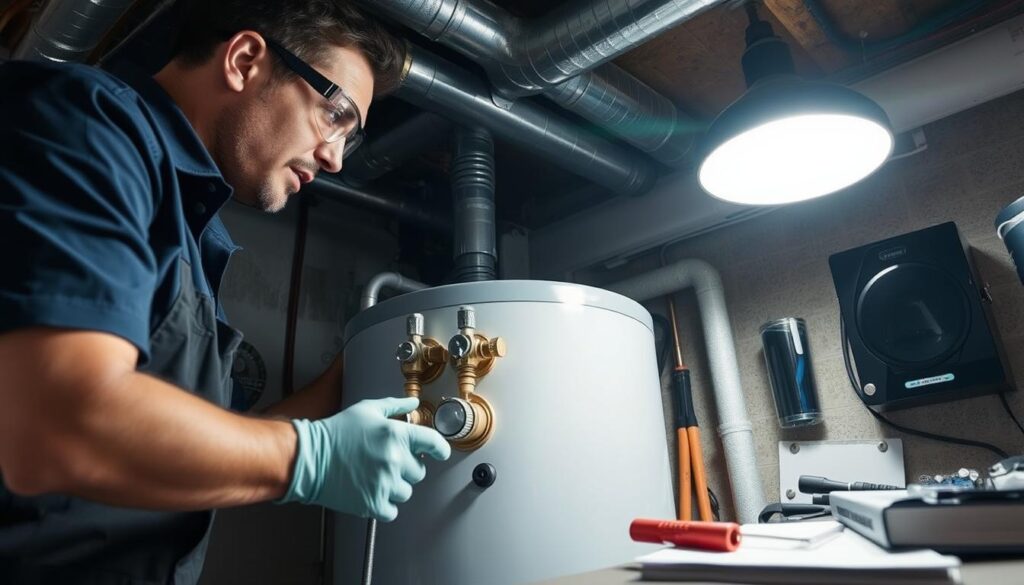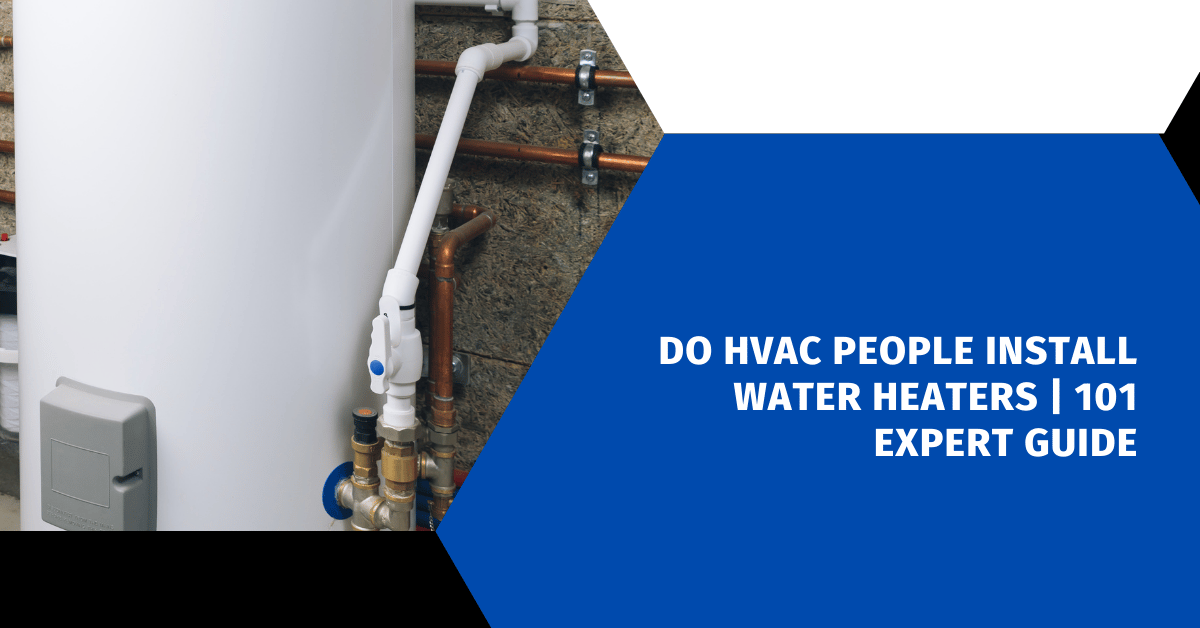Affiliate Disclosure
HVAC Guide Guys is a participant in the Amazon Services LLC Associates Program, an affiliate advertising program designed to provide a means for sites to earn advertising fees by advertising and linking to Amazon.
Do HVAC People Install Water Heaters? “The man who has no imagination has no wings.” – Muhammad Ali
Your HVAC (Heating, Ventilation, and Air Conditioning) technicians might do more than you think. While plumbers usually handle water heater installation, HVAC and plumbing can overlap. This guide will dive into how HVAC pros are involved in water heater services.

Key Takeaways
- HVAC contractors may be authorized to install water heaters in certain regions, depending on their licenses and local regulations.
- Plumbers are typically required for water heater installation and inspection in most areas.
- HVAC professionals often have experience working with various power sources, including gas, electric, and solar, making them well-equipped to handle water heater installations.
- The installation of water heaters can be comparable to the installation of boilers in some regions.
- Proper permits and inspections are crucial for water heater installations, as instances of inspectors monitoring for compliance have increased.
Table of Contents
Understanding HVAC Professionals and Water Heater Services
HVAC (Heating, Ventilation, and Air Conditioning) service providers are key for water heater installation. They can handle gas, electric, and solar-powered units. They know how to work with both traditional and tankless systems for efficient performance.
Types of Water Heater Installations
HVAC experts can tackle many water heater installation tasks. They replace old units with new, energy-saving ones. They also set up water heaters in new buildings, making sure they fit with the plumbing and electrical systems.
Service Provider Qualifications
HVAC service providers must meet certain standards. They often have NATE (North American Technician Excellence) certification. They also need to follow local laws to install water heaters in your area.
Common Installation Scenarios
HVAC pros deal with different water heater installation situations. These include:
- Replacing an old, inefficient water heater with a new, more energy-efficient model
- Upgrading from a conventional water heater to a tankless or solar-powered system
- Installing a new water heater in a new construction or remodeling project
Knowing what HVAC service providers can do helps homeowners make better choices. This ensures a smooth and effective installation process.
Explore Our HVAC Shop
Looking for top-rated HVAC tools, parts, and accessories? Visit our shop and find the perfect solution for your needs.
Visit the ShopLicensing Requirements for Water Heater Installation
Water heater installation rules change based on where you live. In some places, you need a plumber’s license. In others, HVAC contractors can do the job. Sometimes, you need a special HVACR contractor license for certain installations.
It’s key to check local laws before getting your water heater installed. This ensures you follow all necessary rules.
Having the right license is very important. Wrong installation can cause safety problems like scalding and gas leaks. Many places require a permit for installation to check for safety.
In 2007, Texas made it law to need a plumbing permit for water heater installs. The city issues the permit before work starts. Companies like Stan’s in Austin, TX, use licensed plumbers for correct installations.
Always pick a licensed pro for water heater work. Unlicensed people might not know how to fix problems, leading to leaks and safety risks. Licensed plumbers can handle all needed work, including electrical and gas line tasks.
“The life expectancy of a tank water heater is between eight and twelve years, and the installation of a tank water heater typically takes a few hours, while switching to a tankless system would require additional time,” according to industry experts.
In summary, water heater installation rules differ by location. Make sure to find a licensed pro to avoid costly and dangerous problems.
| Statistic | Value |
|---|---|
| Life expectancy of a tank water heater | 8-12 years |
| Installation time for a tank water heater | A few hours |
| Installation time for a tankless water heater | Additional time required |
| Years of experience for Morningside Plumbing team | Over 50 years |
Do HVAC People Install Water Heaters: What You Need to Know
When it comes to water heater installation, the role of HVAC (Heating, Ventilation, and Air Conditioning) technicians can vary. This depends on where you live. HVAC pros are good at many home systems, but some places have rules that stop them from installing water heaters.
Regional Variations in Installation Rights
The rules for installing water heaters change a lot from place to place. For example, in Huntsville, you need a plumbing license to install any water heater. In California and New Jersey, you also need a plumbing license, not just an HVAC one. But, in some areas, homeowners can install water heaters without a plumbing license.
Professional Certifications Required
For local rules, HVAC companies might not be allowed to install water heaters without the right plumbing certifications. You need to follow the local codes and have the right insurance. In some places, HVAC techs can install water heaters, but you should check your area’s rules.
Safety Considerations
Installing a water heater safely means handling gas lines and electrical connections right. It also means following local building codes. HVAC techs with the right skills and certifications can make sure your water heater is installed safely and works well.
Knowing about regional rules, certifications, and safety needs helps you choose the right HVAC company or plumber for your water heater. This way, you make a smart choice for your needs.
Explore Our HVAC Shop
Looking for top-rated HVAC tools, parts, and accessories? Visit our shop and find the perfect solution for your needs.
Visit the ShopComparing HVAC Technicians and Plumbers for Water Heater Installation
Both HVAC technicians and plumbers can install water heaters, depending on local rules. HVAC pros might know more about heating systems and gas lines. But plumbers are experts in water systems and connections.
An HVAC tech said HVAC jobs often pay more than plumbing. They work 40 hours a week, with overtime most of the year. But, a forum member made more as a plumber than as an HVAC tech or installer.
| Year Range | Recommendations for Water Heater Installations |
|---|---|
| 2013-2014 | 4 |
| 2010-2012 | 6 |
| 2007-2009 | 2 |
Forum members had mixed views on which job is harder. HVAC deals with electrical issues, while plumbing has water system complexities. They also talked about other factors like work conditions and learning opportunities.
In the end, both HVAC companies and plumbing services offer skilled water heater installation experts. Your choice depends on local rules, project needs, and the service provider’s expertise.

Types of Water Heaters and Installation Expertise
As an HVAC pro, you can install many water heater types. Each has its own benefits. Let’s look at conventional, tankless, and solar water heaters.
Conventional Storage Water Heaters
Conventional water heaters are the most common. They have a tank to store and heat water. They come in sizes from 20 to 80 gallons and last 8-12 years.
Tankless Water Heater Systems
Tankless water heaters heat water only when needed. They are small, efficient, and can last up to 20 years. But, installing them needs more skill because of their complex setup.
Solar Water Heating Options
Solar water heaters use the sun to heat water. They cut down on energy use and costs. But, they need special knowledge to install and work best in sunny places.
| Water Heater Type | Typical Lifespan | Energy Efficiency | Installation Complexity |
|---|---|---|---|
| Conventional Storage | 8-12 years | Moderate | Relatively Simple |
| Tankless | 20+ years | High | More Complex |
| Solar | 20+ years | Highest | Specialized |
Your skills in installing different water heaters are valuable. Knowing how to install each type helps you serve your customers better. You can help them pick the right water heater for their needs and budget.
Explore Our HVAC Shop
Looking for top-rated HVAC tools, parts, and accessories? Visit our shop and find the perfect solution for your needs.
Visit the ShopPublic Water Supply Regulations and Installation Requirements
When installing a water heater, following public water supply rules is key. These rules help keep the water clean. In some places, only licensed plumbers can connect water heaters to the public water system for safety.
Backflow preventers are also a must. They stop water from flowing back into the public system, which could contaminate it. HVAC pros need to know about these rules and install the right backflow preventers during installation.
In some areas, HVAC techs need special certifications to work with the public water supply. Not following these rules can lead to legal trouble or unsafe installations that harm water quality.
To do a water heater installation right, HVAC pros should learn about local plumbing laws. They might need to work with licensed plumbers or get the right certifications for public water supply connections.
By sticking to these rules, HVAC techs can ensure safe and reliable water heater installations. This meets all standards and keeps the water quality good for homeowners.
| Regulation | Requirement |
|---|---|
| IPC Chapter 4 | Flush valves in water closets should be at least 50mm (2 inches) in diameter. |
| IPC Chapter 5 |
|
| UPC Section 901.0 | Drainage lines should have a minimum slope of ¼ inch per foot to prevent material accumulation. |
| UPC Section 904.0 | Indirect waste pipes should have a diameter of at least one-half of the main line. |
| UPC Section 903.0 | Traps for piping conveying sewage or wastewater should have a diameter of 51mm or 21 inches. |
By following these public water supply regulations, HVAC pros can make sure water heater installations are safe and reliable. This protects both the homeowner and the community’s water quality.
Gas Line and Electrical Connections: Who Can Do What
Installing water heaters, whether gas or electric, needs special skills. HVAC experts are trained to handle both gas and electrical work. They are a trusted choice for water heater setups.
Gas Line Installation Guidelines
Gas water heaters need venting to the outside to safely get rid of exhaust fumes. HVAC technicians with the right training can install gas lines correctly. They make sure it’s done safely and meets all local rules.
This is important because gas work is complex and risky. It requires careful attention to avoid accidents.
Electrical Safety Standards
Electric water heaters need a special circuit breaker for setup. HVAC pros know a lot about electrical safety. They can do the wiring and connections safely.
This skill is key to avoid electrical dangers. It also makes sure the water heater works well and safely.
Even though some places need different licenses for gas and electrical work, many HVAC companies have the needed skills for both. They offer a full solution for your water heater needs.
Working with a skilled HVAC company means your gas and electrical connections will be done right. They follow local codes and put safety first. This can make you feel more at ease and help your water heater last longer, whether it’s a gas water heater or an electric water heater.
“Proper installation and maintenance of gas lines and electrical connections are crucial for the safe and efficient operation of water heaters. Hiring a qualified HVAC professional is the best way to ensure your home’s safety and compliance with local regulations.”
Explore Our HVAC Shop
Looking for top-rated HVAC tools, parts, and accessories? Visit our shop and find the perfect solution for your needs.
Visit the ShopMaintenance and Service Considerations
Keeping your water heater in good shape is key to its long life and efficiency. HVAC companies offer detailed maintenance and service for water heaters and other home appliances. They can do many tasks to ensure your water heater works well.
HVAC technicians do regular checks like flushing the tank and checking the pressure relief valve. They also give tips on saving energy and tell you when it’s time for a new water heater.
- Routine tank flushing to remove sediment buildup
- Inspection and testing of the pressure relief valve
- Checking for leaks and other signs of wear and tear
- Recommendations on improving energy efficiency
- Guidance on when to replace an older water heater
Getting regular maintenance from HVAC services can make your water heater last longer and save you money. Water heaters use about 20% of your household budget, after HVAC systems. So, it’s smart to keep them running efficiently.
“Energy-efficient water heaters are considered long-term investments, offering savings and efficiency benefits over time.”
Working with reliable HVAC providers for your water heater needs means you can relax. You’ll know your hot water system is well taken care of.

Cost Factors in Professional Water Heater Installation
Professional water heater installation costs can vary a lot. Several factors influence the price, including the type of water heater, location, and the installer’s expertise.
Labor Costs and Warranties
Labor costs for installing a water heater can vary. HVAC companies and plumbers charge differently. Many installers offer warranties, giving homeowners extra peace of mind. In Florida, the average cost for installation is between $950 and $3,800.
Equipment and Material Expenses
The cost of the water heater itself also matters. Tankless systems are pricier upfront but can save money in the long run. A standard 50-gallon gas water heater costs $500-$700. Tankless models can cost $1,000 to $4,000 or more.
| Water Heater Type | Average Unit Cost | Average Installation Cost | Estimated Energy Savings |
|---|---|---|---|
| Conventional Tank | $500 – $700 | $950 – $3,800 | 10-15 years lifespan |
| Tankless | $1,000 – $4,000+ | $1,000 – $3,000 | 8-34% energy savings |
| Solar | $1,500 – $6,000 | $3,000 – $8,000 | 50-80% energy savings |
Choosing the right water heater installation contractor is crucial. It affects the quality and long-term costs. Homeowners should think about their needs, budget, and energy goals when picking a water heater.
Explore Our HVAC Shop
Looking for top-rated HVAC tools, parts, and accessories? Visit our shop and find the perfect solution for your needs.
Visit the ShopWhen to Choose HVAC Companies for Water Heater Services
HVAC professionals are great for water heater installation. They can handle gas and electrical connections. They also offer services for heating, cooling, and water heater maintenance.
Choose an HVAC company if you’re updating your heating or cooling systems. They can take care of your home’s climate control and hot water needs.
HVAC companies know how to install water heaters right. They ensure proper ventilation, gas line connections, and electrical wiring. This is important for homeowners who don’t know much about water heater installation.
Regional Variations in Installation Rights
Water heater installation rules vary by region. In Texas, for example, licensed plumbers must work on water heaters. HVAC technicians might not be allowed to install them.
Before picking an HVAC company, check local rules. Make sure they are qualified and licensed for water heater work. This avoids legal and safety problems and ensures the installation is done right.
Safety Considerations
Look for an HVAC company that knows safety. They should handle gas line connections, electrical wiring, and ventilation. Experienced HVAC pros ensure your water heater meets safety standards.
Choosing an HVAC company for water heater services is smart. It’s especially good if you’re updating other climate control systems. HVAC pros offer a comprehensive solution for your home’s comfort and hot water needs.
Conclusion
As an HVAC expert, you can help with water heater installation and service in many places in the U.S. But, you must know the local rules and licenses needed. This knowledge helps you serve your clients better with HVAC water heater installation and professional home services.
Choosing between an HVAC tech or a plumber for water heater work depends on the project’s needs. Look at the water heater type and if the homeowner needs more HVAC services. Make sure the service provider is licensed and follows local codes for safety and efficiency.
Installing a water heater well, by HVAC or plumber, needs a good understanding of systems and parts. Keep up with residential HVAC knowledge to be a trusted and reliable service provider. This way, you meet your customers’ needs while ensuring safety and performance.

